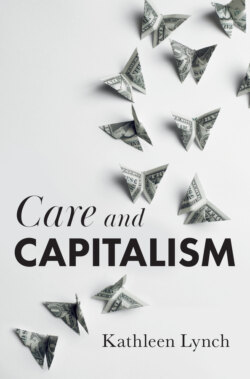Читать книгу Care and Capitalism - Kathleen Lynch - Страница 22
The anti-care culture of neoliberal politics
ОглавлениеAs atomistic market relationships, aligned with and valorized within capitalism, tend to cultivate social relations built on risk/reward calculations, they encourage individuals to be highly competitive, be it in relation to job security, material wealth, social status or moral worth (Wilkinson and Pickett 2009; Bröckling 2015). This feeds disinterestedness and detachment from unaligned and unusable others. Capitalism produces a social ‘nature’ in humans that is characterized by coldness and indifference in politics and public life (Adorno 1978; Ferrarese 2017b). At the same time, rising inequality generates widespread feelings of suspicion, anger and resentment among the body politic and is an important factor in propelling the rise of new-right politics (Golder 2003).6 These combined processes fuel political detachment and undermine the trust that underpins social solidarity and care for vulnerable others (Lynch and Kalaitzake 2018).
These dispositions are exacerbated in neoliberal politics as it is built on the essentialist assumption that human beings are primarily possessive and instrumentally rational individuals, who, while capable of being altruistic, work primarily in ways that are in accordance with their own self-interests (Friedman 2002). To channel this self-interest into politically valuable forms, individuals and institutions must be free from constraints; deregulation, privatization and competition are the guiding organizational norms of the neoliberalized economy and of social and economic life (Harvey 2005: 64–70). Neoliberalism is not only an analytical model, therefore: it is also a normative framework; it prescribes who you should be and how you should be. And it is a political-economic model that demands the state facilitate, implement and enforce free market economics and logics regionally and globally, and across all types of institutions and organizations (Leyva 2019). Neoliberalism does not abandon the state but enlists it to serve its own logic and purposes in a way that is increasingly welfare-indifferent (Korpi 2003; Frericks 2011; Gingrich and Häusermann 2015; Mau 2015).7
